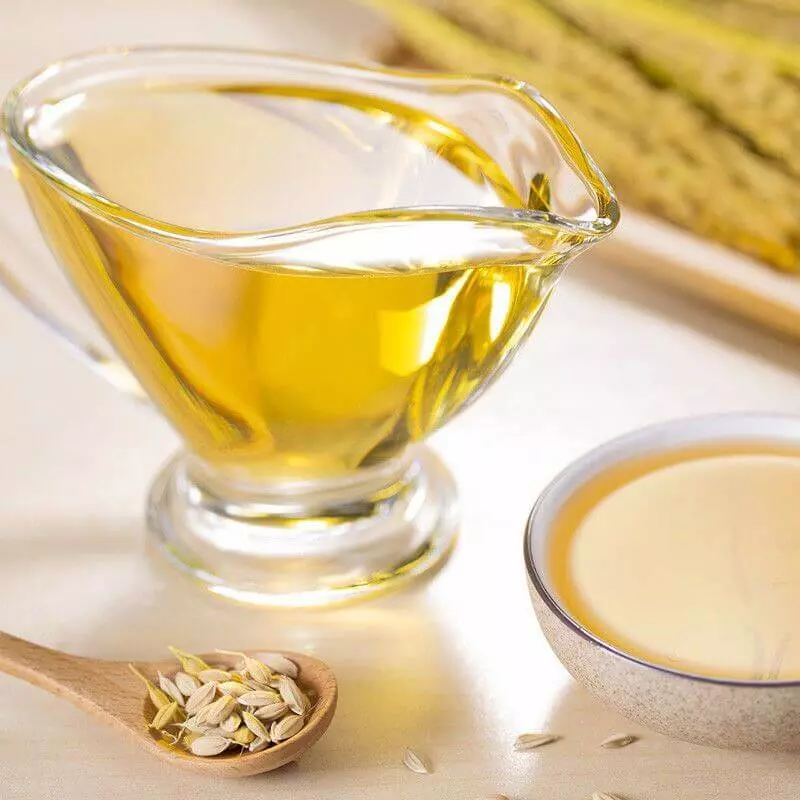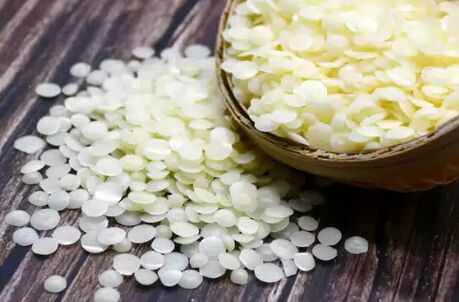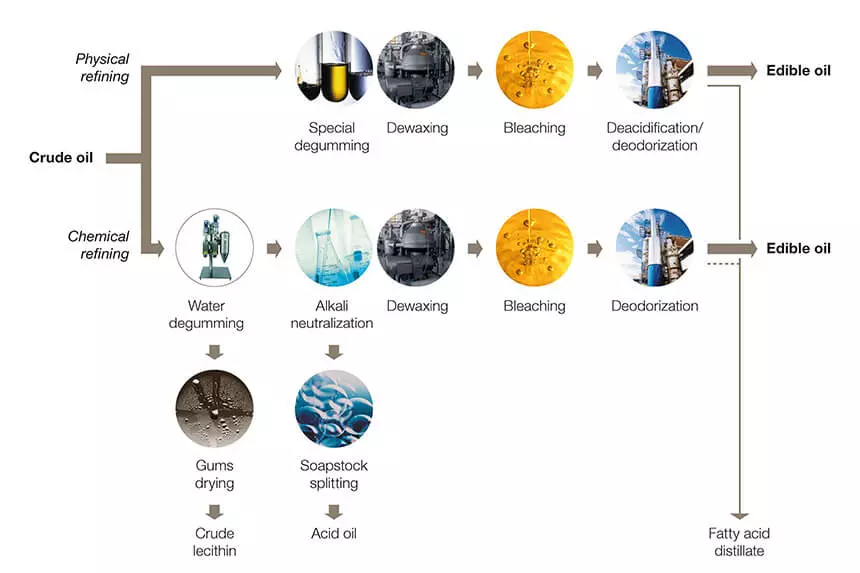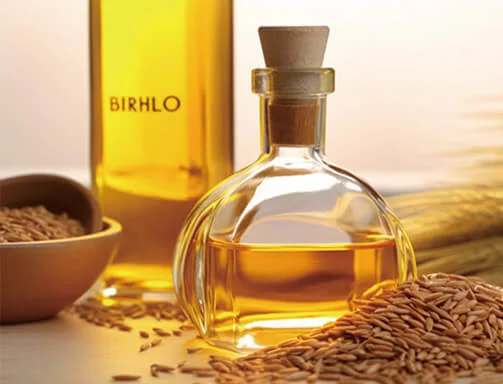
Introduction
Both rice bran oil and sunflower oil are plant-derived, nutrient-rich and versatile. But their differences can affect your cooking, health and even skin.
Let's compare rice bran oil and sunflower oil in terms of raw materials, production processes, physical and chemical properties, health benefits, nutritional value and cooking characteristics to see which is better for you.
Raw Materials and Production Process
Raw Material Sources
Rice bran oil is extracted from the outer layer of rice, known as rice bran. It utilizes a by-product from the rice milling process and is a sustainable option. Rice bran is mainly produced in rice-producing regions such as Thailand and India.
Sunflower oil is derived from the sunflower seeds (Helianthus annuus). Sunflower seeds are specialized in the production of sunflower oil, their main origins include Russia and Ukraine.
![Sunflower oil vs rice bran oil]()
Production Process
Rice bran oil:
- Washing: Wash the rice bran to remove dust and impurities.
- Puffing: Heating (90-100°C) and squeezing the rice bran to inactivate lipases that may cause rancidity.
- Extraction: Extraction of fats and oils by mechanical pressing or oil solvent extraction (usually with hexane).
- Refining: Processes such as degumming, deacidification, bleaching and deodorization result in a stable, clear rice bran oil.
Sunflower oil:
- Cleaning and dehulling: Sunflower seeds are cleaned and dehulled to remove the oil-rich kernels.
- Extraction: Oil is extracted by pressing or solvent extraction.
- Refining: Remove impurities through decolorization, deacidification, deodorization and other refining steps, and finally get high quality and stable sunflower oil.
Physical and Chemical Properties
Rice bran oil and sunflower oil physical and chemical makeup of these oils determines their suitability for various applications. As shown in the table below:
| Property |
Rice Bran Oil |
Sunflower Oil |
| Color |
Light yellow to light amber. |
Golden yellow to light amber. |
| Odor and Flavor |
Light odor, slightly grain aroma, high temperature can still maintain a stable flavor. |
Stronger odor, unique sunflower seed nut flavor, high temperature volatile flavor. |
| Smoke Point |
~232°C (450°F) |
~227°C (440°F) |
| Density (15°C) |
0.913-0.920 g/cm³ |
0.918-0.923 g/cm³ |
| Viscosity |
Medium viscosity, good fluidity, less adherence to food during frying. |
Low viscosity, strong fluidity, suitable for cold salad or low-temperature cooking. |
| Freezing Point |
-10℃ ~ -5℃, still liquid at low temperatures. |
-5℃ ~ 0℃, turbidity or slight solidification may occur in low-temperature environments. |
| Saturated Fatty Acids |
15-20% (mainly palmitic acid) |
10-12% |
| Oleic Acid |
40-50% |
15-65% (large differences among varieties) |
| Linoleic Acid |
30-35% |
60-70% |
| Vitamin E |
Tocopherol, 40-60mg/100g. |
Tocopherol, 100-120mg/100g. |
Sunflower Oil vs Rice Bran Oil Fatty Acid Composition
Sunflower oil higher in polyunsaturated fats, particularly omega-6 fatty acids. While essential, excessive omega-6 without omega-3 balance may promote inflammation, so moderation is key.
Rice bran oil rich in monounsaturated fats, may reduce LDL (bad) cholesterol and lower heart disease risk. It has a balanced omega-6 to omega-3 ratio, though still high in omega-6.
![Rice bran oil vs sunflower oil taste]()
Rice Bran Oil vs Sunflower Oil Health Benefits
Both rice bran oil and sunflower oil offer nutritional benefits, but their health impacts vary.
Rice Bran Oil Health Effects
Research, such as a 2005 University of Rochester study, suggests rice bran oil may lower LDL cholesterol in rats, with potential human benefits.
Rice bran oil suitable for those with allergies. It reduces inflammation and offers cancer-preventing properties.
Sunflower Oil Health Effects
Sunflower oil can reduce LDL and increase HDL (good) cholesterol, supporting cardiovascular health. It can boost immunity.
But some sources suggest, like NDTV, sunflower oil may raise blood sugar in diabetics, though evidence is limited and requires further study.
Both oils are high in omega-6 fatty acids, so balancing with omega-3 sources (e.g., fish, flaxseeds) is recommended to minimize inflammation risks.
Rice Bran Oil vs Sunflower Oil for Cooking
Cooking is crucial when choosing between sunflower oil and rice bran oil.
Rice Bran Oil is a great condiment to drizzle on food, highly stable at high temperatures and also suitable for high temperature cooking.
Sunflower oil is great for stir-frying or sautéing, and tastes delicious when fried and baked. However, it is not suitable for drizzling on food.
Therefore, rice bran oil is more advantageous in meeting all kinds of cooking. This is a significant difference between rice bran oil and sunflower oil.
![Rice bran oil vs sunflower oil for skin]()
Rice Bran Oil vs Sunflower Oil for Skin
Both rice bran oil and sunflower oil are widely used in skin for their nourishing properties.
Rice Bran Oil for Skin
Because sunflower oil is rich in antioxidants and gluten, it moisturizes the skin, improves elasticity, and may reduce aging signs. Rice bran oil is suitable for sensitive skin people and is often used in creams, serums and massage oils.
Sunflower Oil for Skin
Sunflower seed oil prevents skin damage, moisturizes, and helps relieve symptoms such as eczema. Commonly used in lotions, lip balms and skin care products.
Rice Bran Oil vs Sunflower Oil Price
In price, rice bran oil may be higher than sunflower oil due to the complexity of the production process.
Sunflower oil is usually more affordable because sunflower seeds are widely grown and the production process is simpler.
![Rice bran vs sunflower oil]()
Benefits of Rice Bran Oil vs Sunflower Oil
Rice Bran Oil Benefits
- High Smoke Point: Perfect for high-heat cooking, ensuring stability and safety.
- Oryzanol: May lower LDL cholesterol and offer anti-inflammatory benefits.
- Hypoallergenic: Ideal for those with allergies or sensitive skin.
- Versatile Flavor: Subtle nutty taste suits a wide range of dishes.
Sunflower Oil Benefits
- High Vitamin E: Supports immune function and skin health.
- Low Saturated Fat: Better for heart health compared to rice bran oil.
- Affordable: Widely available and budget-friendly.
- Light Flavor: Doesn’t overpower dishes, ideal for delicate recipes.
Conclusion
Overall, both rice bran oil and sunflower oil have their benefits and can fulfill different nutritional health and cooking needs. At the same time, both oils can also bring you considerable value.
Huatai Intelligent Equipment Group manufactures and exports high quality rice bran oil extraction machines and sunflower oil processing machines and we offer complete turnkey solutions. If you want to start a complete rice bran oil production line or sunflower oil processing plant, consult us for free!
References:
![]() Service Coverage
Service Coverage
![]() FAQ
FAQ



















